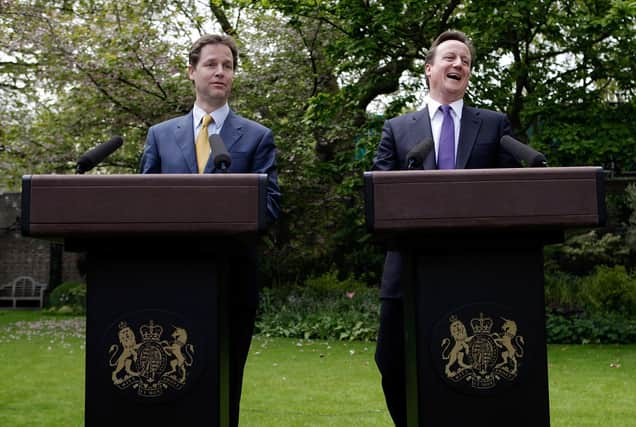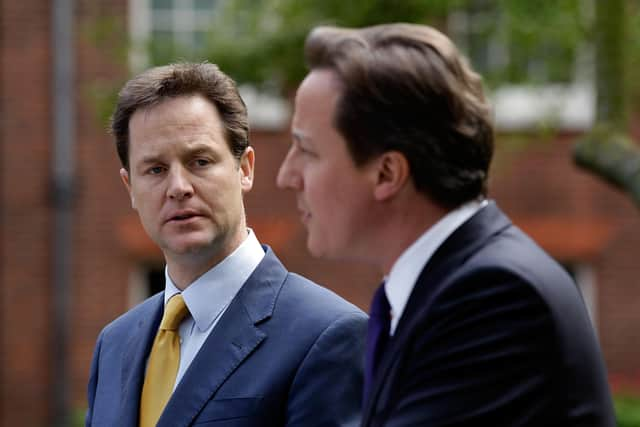Cameron and Clegg’s much-derided Coalition deserves new reputation: William Wallace


Conservatives have claimed its successes as their own, while rubbing the Liberal Democrat contributions out of history. Since last December’s general election, ministers have welcomed the return of ‘normal’ government: a single party in power, with a large majority in the Commons.
Looking back, however, there’s a sharp contrast between the stable government and economic recovery that Coalition Government delivered and both its exhausted and divided Labour predecessor and the confusion and drift we’ve suffered since 2015: three different prime ministers, two further elections, multiple ministerial resignations and party expulsions.
Advertisement
Hide AdAdvertisement
Hide AdThe myth that coalition means weak government has proved false. Brown’s Labour government staggered to its end; and Cameron, May and now Johnson have been unable to provide clear leadership for their divided party.


Britain has a bipolar party system, entrenched by our single-member constituencies and by first-past-the post voting, which has delivered parliamentary majorities to Labour on 35 per cent of the electorate (in 2005) and to the Conservatives on 37 per cent (in 2015). Both its entrenched parties have internal factions: a hard Right within the Conservatives who made life hell for John Major as prime minister and, after 2015, for David Cameron, and a hard Left for Labour.
Voters were rightly determined to protect the country from a Corbynista government in the 2019 election. But we now find ourselves instead with a Vote Leave Government, with the most talented Conservatives expelled or stepping down, leaving a weak Cabinet distinguished only by the commitment of its members to a much sharper break with our European neighbours than Theresa May was trying to negotiate.
The Liberal Democrats suffered dreadfully for their participation in the 2010-15 coalition. We made the huge error of promising beforehand to abolish university fees, without appreciating the hard compromises that have to be negotiated in economic crisis. But we moderated the direction of Conservative policy, and neutralised the influence of their embittered right.
Advertisement
Hide AdAdvertisement
Hide AdWe raised the minimum at which low-paid workers pay income tax in successive budgets, significantly increasing their income. We introduced the pupil premium for poorer children, giving additional funds to schools that most needed it. Ed Davey as secretary of state for Energy and Climate Change pushed forward on renewable energy faster than Conservatives thought possible. Vince Cable as business secretary established the Regional Growth Fund and the Green Investment Bank. Norman Lamb expanded the health service’s capacity for treating mental health.
It’s always more difficult to demonstrate the policies that you successfully blocked than those that you promoted. Conservative actions after 2015, however, remind us of what the coalition had prevented until then.
The 2015 budget slashed funding for the introduction of Universal Credit, transforming what should have been a simplification of Britain’s complex benefits system into a squeeze on the poor.
After the coalition had successfully reduced the budget deficit by 50 per cent between 2010 and 2015, the Conservatives on their own were determined to cut further and faster, damaging local government, the NHS, and schools. Internal warfare between ‘One Nation’ Conservatives and the libertarian and Eurosceptic Right broke out again, to destroy first Cameron and then May and now to leave Johnson – a natural ‘One Nation’ moderate – the prisoner of his Right.
Advertisement
Hide AdAdvertisement
Hide AdCoalition government has to negotiate policies. It also has to keep two sets of MPs informed and supportive, through careful attention to Parliament. Boris Johnson, a better campaigner than prime minister, is bypassing his Cabinet, doing his best to avoid parliamentary scrutiny, and fudging his messages to keep the factions within his own party on side.
Government is a difficult business. A single-party Labour government under Corbyn would have been a disaster, but Johnson’s one-party Government is already divided and confused. Britain would be better governed if we changed our constitutional assumptions and our voting system, and accepted the more successful multi-party pattern of government we see in Ireland, Denmark, the Netherlands and other neighbouring countries.
Lord Wallace of Saltaire is a Lib Dem peer. He was a Minister in the 2010-15 Coalition Government.
Editor’s note: first and foremost - and rarely have I written down these words with more sincerity - I hope this finds you well.
Advertisement
Hide AdAdvertisement
Hide AdAlmost certainly you are here because you value the quality and the integrity of the journalism produced by The Yorkshire Post’s journalists - almost all of which live alongside you in Yorkshire, spending the wages they earn with Yorkshire businesses - who last year took this title to the industry watchdog’s Most Trusted Newspaper in Britain accolade.
And that is why I must make an urgent request of you: as advertising revenue declines, your support becomes evermore crucial to the maintenance of the journalistic standards expected of The Yorkshire Post. If you can, safely, please buy a paper or take up a subscription. We want to continue to make you proud of Yorkshire’s National Newspaper but we are going to need your help.
Postal subscription copies can be ordered by calling 0330 4030066 or by emailing [email protected]. Vouchers, to be exchanged at retail sales outlets - our newsagents need you, too - can be subscribed to by contacting subscriptions on 0330 1235950 or by visiting www.localsubsplus.co.uk where you should select The Yorkshire Post from the list of titles available.
If you want to help right now, download our tablet app from the App / Play Stores. Every contribution you make helps to provide this county with the best regional journalism in the country.
Sincerely. Thank you.
James Mitchinson
Editor
Comment Guidelines
National World encourages reader discussion on our stories. User feedback, insights and back-and-forth exchanges add a rich layer of context to reporting. Please review our Community Guidelines before commenting.